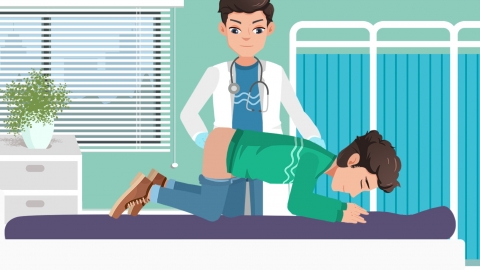How to treat anal fissure with rectal bleeding
Generally, rectal bleeding caused by anal fissures may be due to factors such as dry and hard stools rubbing against the anal canal, poor defecation habits, perianal bacterial infection, ulcerative colitis, or anal stenosis. It is recommended to seek timely medical attention, identify the underlying cause, and then improve symptoms under a doctor's guidance through general management, medication, surgery, or other treatments. Specific causes are analyzed as follows:

1. Dry and hard stools rubbing against the anal canal: Prolonged retention of feces in the intestine leads to water loss and hardening of stool, which can tear the skin of the anal canal during bowel movements, causing bleeding. Drink 1500–2000 mL of water daily, consume fiber-rich foods such as celery and dragon fruit, and if necessary, use lactulose oral solution as directed by a physician to soften stools.
2. Poor defecation habits: Spending too long on the toilet or excessive straining during bowel movements can worsen injury to the anal canal and lead to bleeding. Develop regular bowel habits, limit each bowel movement to no more than 5 minutes, avoid using mobile phones during defecation to maintain focus, and reduce pressure on the anal canal.
3. Perianal bacterial infection: Poor perianal hygiene allows bacterial overgrowth, leading to inflammation that delays healing of fissures and results in bleeding. Wash the perianal area with warm water after bowel movements, and apply anti-inflammatory ointments such as mupirocin ointment, erythromycin ointment, or fusidic acid cream as prescribed to promote healing.
4. Ulcerative colitis: Abnormal immune response in the intestine causes mucosal ulcers; when inflammation spreads to the anal canal, it can result in fissures and bleeding, often accompanied by diarrhea and mucus in the stool. Take medications such as mesalamine enteric-coated tablets, sulfasalazine enteric-coated tablets, or olsalazine sodium capsules as directed by a physician to control inflammation.
5. Anal stenosis: Congenital developmental abnormalities or post-surgical scarring can cause narrowing of the anus, leading to tearing of the anal canal during bowel movements and subsequent bleeding. When conservative treatment fails, anal dilation surgery may be performed to widen the anal opening and reduce the risk of trauma during defecation.
Avoid consuming spicy and irritating foods such as chili peppers and Sichuan pepper to minimize irritation to the anal mucosa. Sit in warm water baths at around 40°C for 1–2 sessions daily, each lasting 15 minutes, to promote blood circulation in the perianal area. Wear loose, breathable cotton underwear and wash and change them frequently to keep the area clean and dry.




